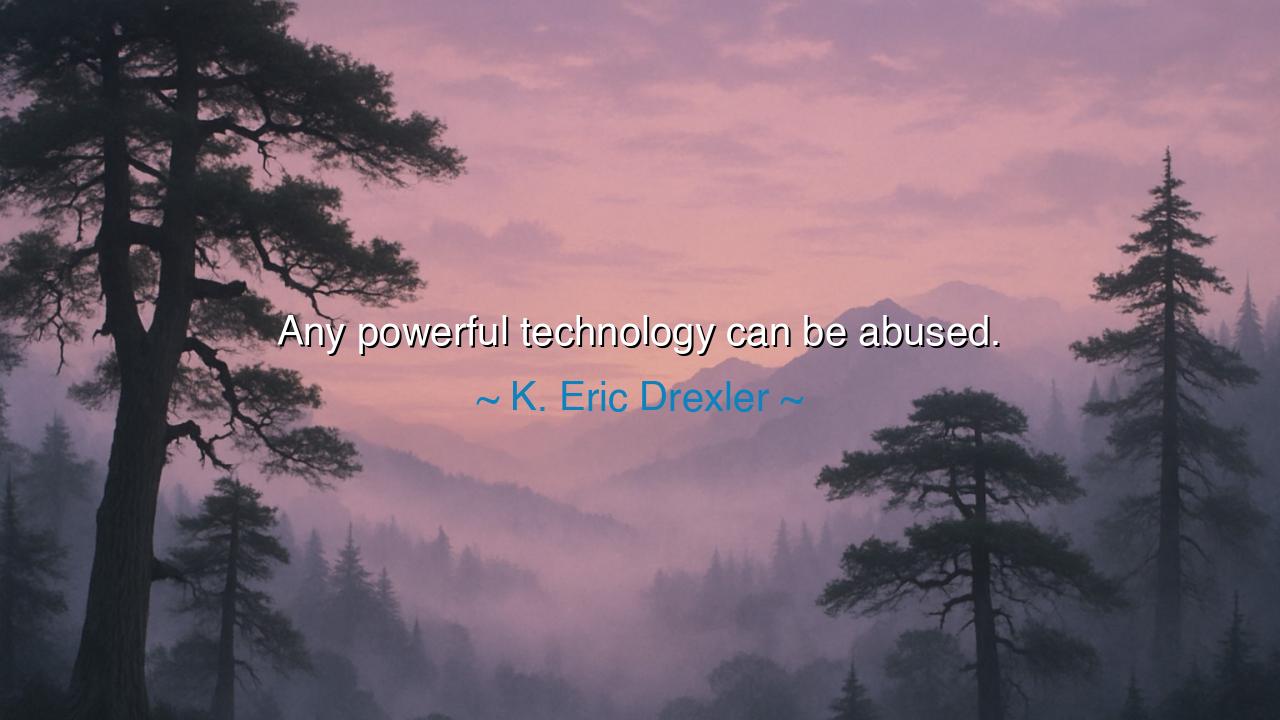
Any powerful technology can be abused.






K. Eric Drexler, a visionary of nanotechnology, once declared with solemn brevity: “Any powerful technology can be abused.” These words, though simple, carry the gravity of ages, for they remind us that every gift of human ingenuity bears within it the seeds of creation and destruction. To hold power is to hold choice; to invent is to open both the gates of paradise and the doors of ruin. Thus, Drexler’s warning is not bound to the modern world alone—it is the eternal law of progress.
The ancients themselves knew this truth, though their tools were simpler. Fire, once stolen from the gods, became the hearth that warmed homes and cooked food, yet it also became the torch that burned cities and fields. Iron brought plows that fed nations, yet also forged swords that spilled rivers of blood. So too with every new technology: it is a double-edged gift, one side blessing, the other curse. Drexler names what humanity has always known in its heart—that the brighter the flame of invention, the darker the shadow it casts.
History offers us countless examples. Consider the discovery of nuclear energy. Born from the genius of physics, it promised near-limitless power, a new dawn for civilization. Yet in the same breath, it unleashed horrors upon Hiroshima and Nagasaki, scorching cities into silence. The same science that could light the world also nearly drowned it in fire. Here, Drexler’s words resound with full force: any powerful technology can be abused. The abuse does not negate the value, but it demands vigilance, humility, and responsibility.
Another tale comes from the Industrial Revolution. Machinery gave humanity strength beyond muscle, weaving cloth, building bridges, carrying voices and goods across continents. Yet in its abuse, it enslaved children in factories, blackened skies with soot, and crushed men under the weight of profit. The same engines that lifted society also chained it. From this history, we see the eternal tension—technology is a servant that can either uplift or enslave, depending on the heart that commands it.
Drexler’s warning is also deeply personal. It teaches that invention is never neutral—it bends toward the character of its wielder. A knife in the hands of a healer saves life; the same blade in the hands of a murderer destroys it. So too with nanotechnology, with artificial intelligence, with all the wonders of our age: their value lies not only in what they can do, but in how we choose to use them. To invent is not enough—we must also cultivate wisdom, restraint, and responsibility.
The lesson, then, is this: do not marvel at power alone, but measure always the heart that wields it. In our own lives, whenever we hold tools of influence—whether words, wealth, or knowledge—we too must ask: Am I using this to build, or to destroy? Let us not be blind to the dangers, nor paralyzed by fear, but walk the narrow path of responsibility. Technology is not the enemy; it is the mirror of human will. Its abuse is a reflection not of circuits or engines, but of our choices.
So, dear listener, carry Drexler’s wisdom like a shield: whenever you encounter great power, remember that its strength lies in your hands, and your hands alone decide its destiny. Use fire to warm, not to burn. Use knowledge to heal, not to enslave. Use invention to serve life, not to extinguish it. For in the end, it is not the technology that will be judged by history, but the souls of those who wielded it. Any powerful technology can be abused—but it can also, in wise hands, become the salvation of generations.






AAdministratorAdministrator
Welcome, honored guests. Please leave a comment, we will respond soon